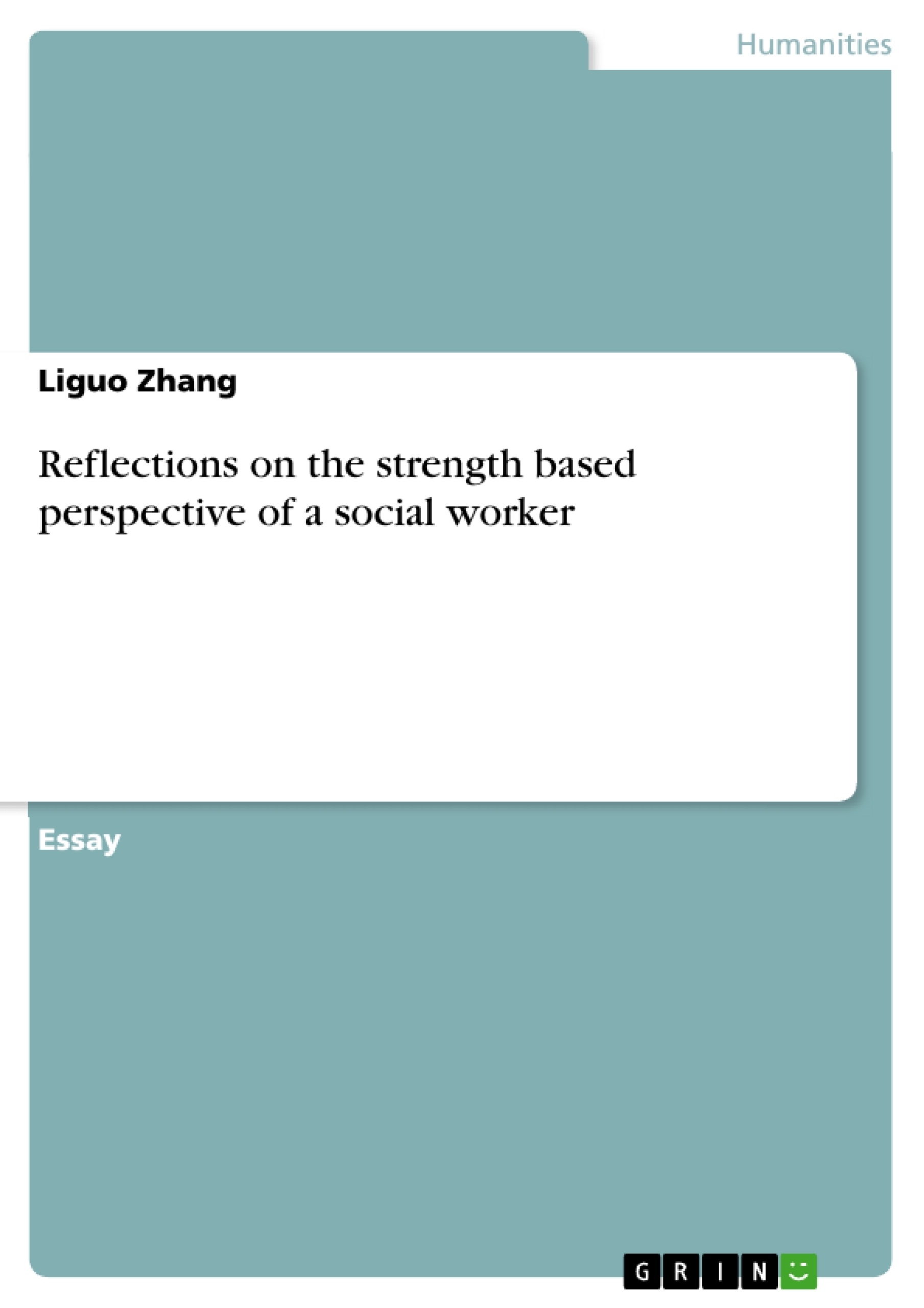This paper is about my reflection of the basic concepts of the strength-based perspective based on a series of readings in my MSW course social work 700, combined my previous social work practice to illustrate what has resonated or challenged me, the pro and cons of this perspective, and the limitation of this of perspective exposed in my practice.
Table of Contents
- 1. Overview
- 1.2. Evaluation and critique
Objectives and Key Themes
This paper reflects on the strengths-based perspective in social work, examining its advantages and limitations through personal experiences and academic readings. The author aims to critically analyze the approach's applicability, particularly within the context of working with marginalized immigrant populations.
- Advantages and disadvantages of the strengths-based approach
- The limitations of the strengths-based perspective when applied to marginalized communities
- The importance of considering socio-economic and structural factors in social work practice
- The role of cultural barriers and racism in mental health issues among immigrant communities
- The need for a multi-dimensional approach to address social problems
Chapter Summaries
1. Overview: This section introduces the strengths-based approach, highlighting its emphasis on building caring relationships with clients, recognizing their inherent strengths, and fostering self-determination. It contrasts this approach with conventional helping models, which often view the individual as the problem. The strengths-based perspective prioritizes mutuality, affirmation of human dignity, and an inductive approach that emerges from client narratives and relationships. It emphasizes the client's inherent capacity for growth, healing, and self-directed change, while acknowledging the crucial role of the social worker in facilitating this process through trust, exploration, and mutual agreement.
1.2. Evaluation and critique: This section critically evaluates the strengths-based perspective through the lens of the author's experience working with immigrant families facing mental health challenges. While acknowledging the value of focusing on client strengths and empowerment, the author identifies limitations. The perspective is criticized for potentially overlooking the significant influence of socio-economic factors, discrimination, and structural inequalities on mental health. The author argues that a purely strengths-based approach can neglect systemic issues and place undue responsibility on the individual. The author's experiences highlight the necessity of incorporating critical anti-racist frameworks to fully understand the complex interplay of cultural barriers, racism, and structural oppression in the lives of marginalized individuals and families. Personal anecdotes, such as the author's son's struggles with language barriers and discrimination upon immigrating to Canada, illustrate the limitations of focusing solely on individual strengths without acknowledging systemic obstacles.
Keywords
Strengths-based perspective, social work, immigrant mental health, cultural barriers, structural inequalities, racism, empowerment, self-determination, critical anti-racist framework, socio-economic factors, marginalized communities.
FAQ: Strengths-Based Perspective in Social Work with Marginalized Immigrant Populations
What is the main focus of this paper?
This paper critically examines the strengths-based perspective in social work, analyzing its advantages and limitations, particularly when applied to marginalized immigrant populations. It explores the balance between focusing on individual strengths and acknowledging systemic issues like socio-economic factors, discrimination, and structural inequalities.
What are the key themes explored in the paper?
Key themes include the advantages and disadvantages of the strengths-based approach; its limitations when working with marginalized communities; the importance of considering socio-economic and structural factors; the role of cultural barriers and racism in mental health; and the need for a multi-dimensional approach to address social problems.
What is the strengths-based approach in social work?
The strengths-based approach emphasizes building caring relationships with clients, recognizing their inherent strengths, fostering self-determination, and prioritizing mutuality and affirmation of human dignity. It contrasts with conventional models that often view the individual as the problem.
What are the limitations of the strengths-based perspective highlighted in the paper?
The paper argues that a purely strengths-based approach can overlook significant socio-economic factors, discrimination, and structural inequalities affecting mental health. It can potentially place undue responsibility on the individual while neglecting systemic issues. The author emphasizes the need to incorporate critical anti-racist frameworks.
How does the paper address the issue of working with immigrant populations?
The paper uses the author's experiences working with immigrant families facing mental health challenges to illustrate the limitations of a solely strengths-based approach. Personal anecdotes highlight the impact of language barriers, discrimination, and systemic obstacles on mental well-being.
What is the author's conclusion regarding the strengths-based approach?
The author advocates for a more comprehensive approach that integrates the strengths-based perspective with a critical understanding of systemic issues and structural inequalities. A multi-dimensional approach, incorporating anti-racist frameworks, is deemed necessary to effectively address the complex challenges faced by marginalized immigrant communities.
What are the key words associated with this paper?
Strengths-based perspective, social work, immigrant mental health, cultural barriers, structural inequalities, racism, empowerment, self-determination, critical anti-racist framework, socio-economic factors, marginalized communities.
What is included in the Table of Contents?
The Table of Contents includes an Overview and a section on Evaluation and Critique of the strengths-based perspective.
- Quote paper
- mastef of social work Liguo Zhang (Author), 2014, Reflections on the strength based perspective of a social worker, Munich, GRIN Verlag, https://www.grin.com/document/341879




